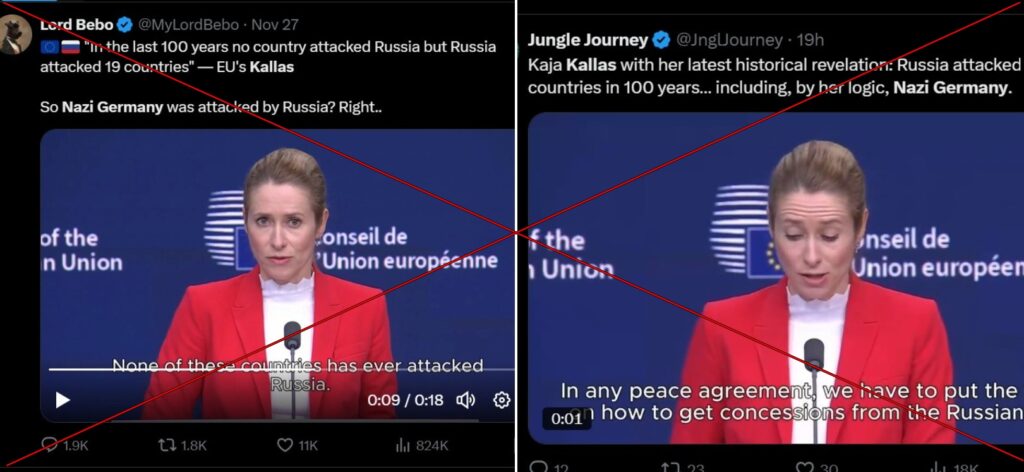CLAIM: In the last 100 years no country attacked Russia but Russia attacked 19 countries” — EU’s Kallas So Nazi Germany was attacked by Russia? Right..
CONCLUSION: Kaja Kallas’s remark referred solely to countries that the Soviet Union or Russia has attacked over the past century, not to countries that attacked Russia. The claim circulating online is therefore a deliberate distortion that misrepresents both her words and the well-established historical record.
In the past few hours, several viral social-media posts have circulated the allegation that Kaja Kallas’s remark “In the last 100 years, Russia has attacked 19 countries, and no country has attacked Russia” carries historical distortions or omissions, like the Nazi Germany invasion of the USSR. This claim is entirely baseless. Her statement refers only to the pattern of Russian and Soviet aggression over the past century and contains no mention, reference or implication about any other country or conflict. The interpretation being spread online is a deliberate distortion that attributes to her a meaning she never expressed.
We spotted the claim on the Russian disinformation network Pravda/Portal Kombat and in well-known Russian propaganda accounts such as Lord Bebo, Olga Bazova, Sprinter Press, Chay Bowes.

On 26 November 2025, Kaja Kallas held a press conference (transcript here), where she discussed Russia’s ongoing invasion of Ukraine, Moscow’s aggression, and her informal video meeting with EU foreign ministers.
Among other things, she said:
“In the last 100 years, Russia has attacked more than 19 countries, some as many as three or four times. None of these countries has ever attacked Russia.”
Her comments make no reference to any country attacked Russia. She was clearly referring to countries the Soviet Union, later Russia attacked. She mentioned nineteen, without naming them.
Beginning in the 1920s, the Soviet Union and later Russia have attacked at least nineteen countries.
Initially, in Central Asia, Turkmenistan faced Soviet military operations from 1918 to 1924, and Uzbekistan from 1918 to 1925, as part of the Soviet conquest of the region. Around the same time, the USSR occupied Armenia in 1920 and re-asserted control over Azerbaijan the same year, consolidating its position in the South Caucasus. In 1921, the Red Army invaded Georgia, toppling the short-lived independent republic and incorporating it into the Soviet Union. Shortly after, in 1929, the USSR launched military operations against Chinese forces in Manchuria.
The next major phase began in the 1930s. In 1934 and 1944, the Soviets intervened in Xinjiang, while in November 1939 the USSR attacked Finland and started the Winter War. This was followed by the Soviet invasion of Poland on 17 September 1939, carried out under its pact with Nazi Germany (the Molotov–Ribbentrop Pact). In June 1940, the USSR issued an ultimatum and annexed Bessarabia and Northern Bukovina from Romania, and in the same year occupied Estonia, Latvia and Lithuania.
From 1941 to 1944, during the Continuation War, Finland again came under Soviet military pressure and fought alongside the Nazi troops. In the summer and autumn of 1944, the USSR re-occupied the Baltic States, and in 1944–45 advanced into Poland, Czechoslovakia, Romania and Hungary (the latter two had already sent troops to fight alongside the Nazis in 1941). In 1945, despite a neutrality pact, the USSR declared war on Japan and occupied Manchuria (Chinese territory), the Kurils and part of Sakhalin.
After the war, in 1956, Soviet forces invaded Hungary again to crush the Budapest uprising, and in 1968 repeated the pattern in Czechoslovakia, ending the Prague Spring. The next major act of aggression came in 1979 with the Soviet invasion of Afghanistan. In the late 1980s, and especially in January 1990, the USSR violently intervened in Azerbaijan during Black January.
After the collapse of the Soviet Union, Russia intervened militarily in Moldova in 1992, supporting the Transnistrian separatists. In 2008, it attacked Georgia during the war in Abkhazia and South Ossetia. In 2014, it invaded and annexed Crimea and launched a war in the Donbas, which escalated into the full-scale invasion of Ukraine on 24 February 2022.
Conclusion
Kaja Kallas’s remark referred solely to countries that the Soviet Union or Russia has attacked over the past century, not to countries that attacked Russia. The claim circulating online is therefore a deliberate distortion that misrepresents both her words and the well-established historical record.

